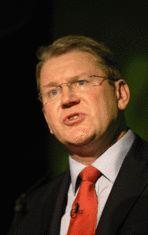
Food security has risen to the top of the political agenda, yet government policies are still very much informed by the problems of the past rather than the new realities that the world now faces, NFU president Peter Kendall said today.
Speaking at an international conference entitled ‘Food security in the 21st century’ organised by the renowned think-tank Chatham House, Kendall said greater emphasis needs to be placed on investment in research and development, trade and competitiveness if the challenge of increasing agricultural production by at least 100 per cent by 2050 was to be met.
“That food security features as a theme in almost every daily newspaper shows the political significance of the issue. The term is being hotly debated and this conference could not be better timed. As we have pointed out, the irony of the food crisis is that many of the problems result from low prices and under-investment in farming worldwide,” Kendall said.
“Food security does not mean that every country in the world should produce all the food it needs to feed itself. Yet one of the frequent responses in some parts of the world to high domestic food prices has been export restrictions, which have compounded problems in food markets and stifled agricultural investment. Swingeing export taxes and the like are fully permitted under WTO rules, but there is simply no logic to this lack of regulation.
“The changing world meant it was extremely naïve to assume that if domestic production falls, food security in countries like the UK would not be threatened because we would be able to trade ourselves out of trouble,” Kendall said.
“The UK government has a crucial role to play at both a national and global level. Unfortunately, its vision for agricultural policy is still very much informed by the problems of the past, and not the realities of the present, or the prospects for the future. The agenda has moved on, and yet the UK government is not moving with it.
“For example we see a mere ten per cent of rural development monies used in the UK to promote competitiveness and productivity with the vast majority ploughed into environmental measures. Sustainable and productive farming can go hand in hand, but this warrants reflection. There is a belief that the industry has to drive R&D. I applaud the work of the private sector, but farmers as individual businesses are in no place to lead strategic investment that takes 20 years or more to pay off. Government has a vital role to play.”
Kendall acknowledged Secretary of State Hilary Benn’s announcement of a new Council of Food Policy Advisors at the event, to include expertise from every sector of the food system.
“We are awaiting further information on the membership and remit of this group. Provided that the importance of primary food production is recognised in the group, it can only be a good thing. We recently called for a new Public Service Agreement (PSA) target for productive agriculture to match the target that Defra has for biodiversity. With the creation of this Council perhaps now is the time for Defra to embrace this idea.” said Kendall.



